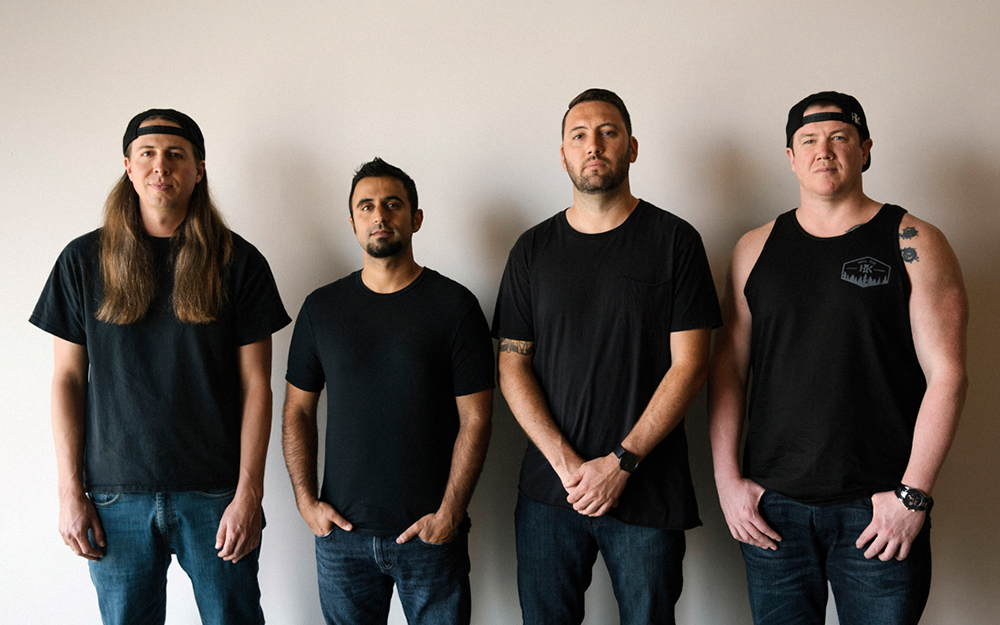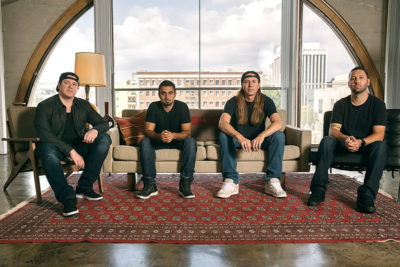
By Rich Henrich
What happens in Isla Vista doesn’t always stay in IV and at least in the case of Rebelution, that’s a wonderful thing. What happens when an anthropology student meets a business economics major who in turn meets a religious studies major who meets a film studies student? In the little student ghetto of University of California, Santa Barbara, five guys came together to make some music and throw a party. Now after a decade of touring and recording, four members (all with degrees from UCSB) carry the rebellion forward- Eric Rachmany, Rory Carey, Marley D. Williams and Wesley Finley- and onto the stages of Desert Oasis after posting number one hits on the Billboard charts and touring relentlessly 100+ days a year.
This past weekend, I spoke with frontman for the band, Eric Rachmany, from his home in San Francisco.
CVW: Eric, what’s behind the name of the band?
Eric Rachmany: “It’s a play on words. We like to think of rebellion in a positive way and often times it is only viewed in the negative view but we see the rebel as a positive force for change and enjoy spreading a message of love and evolution through our art.”
CVW: Why is Reggae such a strong platform for social consciousness?
Rachmany: “It always has been. The music itself was created to tell stories of what people experienced. We like to listen to all those reggae artists that came before us like Marley, who sang about the injustices. We are lucky to come from California where it truly is a melting pot and our message is really about embracing each other’s differences and sharing good vibes. There is such a need for this right now.”
CVW: You have a degree from UCSB in Religious Studies. How does that knowledge influence your music?
Rachmany: “A LOT! I have always been interested in different religions, especially the intersection of religion and art in all the practices. I never identified with a particular religion but am interested in why people do identify with a certain religion or practice. The more I study, the more I realize that our racist thoughts are sad misunderstandings. I think art exposure helps encourage deeper understandings and appreciation. My parents raised me on world music and I was fortunate to grow up in such a house. People need to look past how the media portrays various religions and see the beauty in the art.”
CVW: How have you changed as a band since the beginning? Courage to Grow seems to reflect your own evolution as a band.
 Rachmany: “Well, at first we were just a cover band and didn’t know what we were doing. We learned how to be better performers and be more comfortable on stage. I used to get really nervous on stage but now I am more comfortable with the music. We played a lot of gigs for $150 per night. It’s taken a lot of hard work but you have to follow your heart. I’ve learned to be more patient, get in my comfort zone even when I wish I had my bed! When crowd picks up their energy and I connect artist to listener, it’s all worth it. As for Courage, I think it means something different to everyone in the band but for me it was about having courage to grow as a person, a musician and as a band.”
Rachmany: “Well, at first we were just a cover band and didn’t know what we were doing. We learned how to be better performers and be more comfortable on stage. I used to get really nervous on stage but now I am more comfortable with the music. We played a lot of gigs for $150 per night. It’s taken a lot of hard work but you have to follow your heart. I’ve learned to be more patient, get in my comfort zone even when I wish I had my bed! When crowd picks up their energy and I connect artist to listener, it’s all worth it. As for Courage, I think it means something different to everyone in the band but for me it was about having courage to grow as a person, a musician and as a band.”
CVW: With so much political unrest the world over, how does your music help bring people together?
Rachmany:”Music and art in general gets to people’s soul. I couldn’t just stand on a stage and talk to people for an hour and get them to feel the music. I shine when I can play music and arts have that ability to create positive change. If our music changes one point of view, we are really thankful for that impact.”
CVW: What do you look forward to?
Rachmany: “Our new album, our 6th and we went back to doing it with just us. We are really the most democratic band in the history of music! We are practically married together. Definitely looking forward to seeing Damian Marley, The Green and Inner Circle, who let us record at their studio and taught us so much.”











































